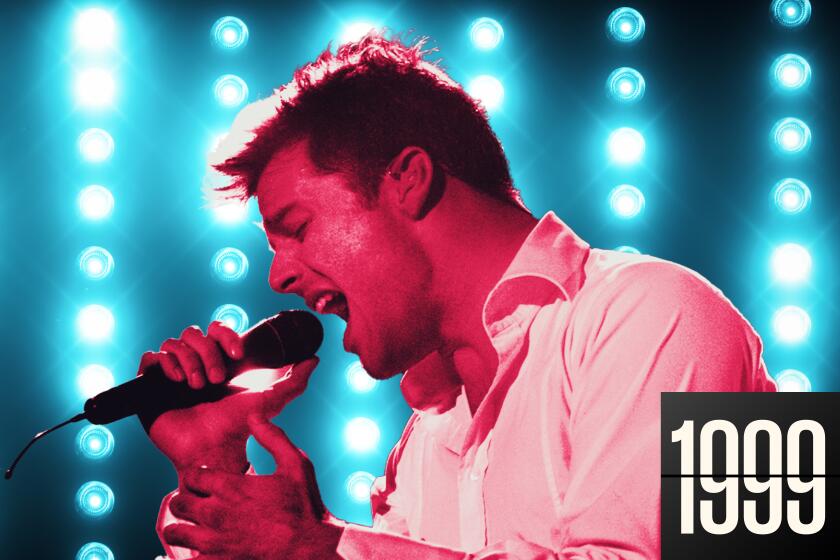Games of ‘Chance’
In recent years, veteran Orange County blues musician James Harman could be found buying lottery tickets everywhere he went, betting on the ponies, even feeding the one-armed bandit in Nevada.
Had this hard-working singer, harmonica player and songwriter, who says he loathes blues stereotypes, been sucked in, after more than 35 years in the business, by the hedonism and impulsiveness that underlie the stereotypes?
Nah. He was just doing research.
The trips to the track and the casino were strictly for soaking up the sights, the sounds and the experience of the gambling milieu, in hopes of gleaning images and bits of dialogue and terminology he could use in song lyrics for his new album, “Takin’ Chances,” which examines the theme of life’s gambles and risks.
Harman kept buying lottery tickets--none more than a $40 or $50 winner, of course--because he wanted just the right model for the CD cover and booklet design he had in mind.
“I never gambled before in my life, never played a game of chance,” Harman, a voluble, inexhaustible talker, said in a recent phone interview squeezed into a hectic pre-Christmas crush of family obligations and over-the-phone business negotiations conducted from his longtime home in Huntington Beach.
“To research this project, I went to the racetrack twice with a friend in Kansas City and listened carefully to everything everybody said, and twice to the racetrack in Del Mar. I met all kinds of interesting characters. I could write three movies about racetracks.”
Instead, Harman wrote one song, “Five’ll Getcha Ten,” a highlight on his best album since his two excellent late-’80s releases, the rock-oriented “Those Dangerous Gentlemens” and “Extra Napkins,” the 1988 traditional blues session that this year received a W.C. Handy Award nomination for best blues reissue.
With characteristic wry humor, the song traces a gullible fellow’s day at the races, down to the moment he visits the paddock--”I didn’t know what a paddock was,” Harman notes--and stares down the horses he’s been told to bet on, hoping to find one with the look of a winner.
“I probably would never go [to a track] again,” Harman said. “If I put down a dollar, I want back a dollar’s worth of something I wanted. I came up the hard way; I’m a policeman’s son. It’s never been that easy, and gambling [money] away is unthinkable.”
Harman, who grew up in Anniston, Ala., and Panama City, Fla., before moving to Orange County in 1970, spends the album puncturing the idea of foolish risk-taking. He also underscores the need to accept that everyday existence is nevertheless a gamble, a game of chance we must get on with, or else see our lives pass us by.
“You can buy a Maytag, baby, if you want guarantees / Love is all I’m offering, with no warranties,” he sings in a particularly pithy and typically colorful couplet from “Crapshoot,” a song embracing the vicissitudes of love.
The hourlong CD’s loose thematic unity is a plus, but the performances and song arrangements make it special. Harman deploys a shifting cast of musicians, including luminaries from past James Harman Band lineups.
The musicians lend their talents to a song list that offers a deliciously varied array of styles, moods and textures.
An insouciant, New Orleans street-parade of horns and percussion marches through “Frolictime,” while Harman whoops it up with a lively assortment of Little Richard shrieks and priceless, funny asides in his portrayal of a bon vivant being led into temptation.
Equally memorable is “Old Man Eyes,” in which a sparse, elemental John Lee Hooker-goes-gospel arrangement drives home lyrics about hard-won wisdom that Harman delivers with a graybeard’s phlegmy rasp.
Two mainstays from the potent and cohesive 1980s James Harman Band lineup are back for guest turns: guitarist David “Kid” Ramos, now of the Fabulous Thunderbirds, and drummer Stephen T. Hodges, who went on to record with Tom Waits and has been touring recently with Smashing Pumpkins.
Jeff Turmes and Robbie Eason, two leading players from Harman’s early-to-mid-’90s lineups, are back. The cast of characters also includes Junior Watson, an amazingly dexterous and playful O.C. guitarist; veteran Virginia-based blues bandleader Bob Margolin; and Tom Mahon, a gifted piano player who is in Harman’s current touring lineup.
“This was supposed to be an album of old friends and alumni,” Harman said. “You’re limited by [a set band lineup]. It’s going to be the same thing over and over again. I’m really pleased with the [varying personnel] setups. Every track on there has a great, rich character to me. It’s the way I heard ‘em in my head.”
*
‘Laughin’ It Up’
Re-acclimating to Harman’s approach after 10 years was no problem for Ramos, who plays on three of the album’s dozen tracks.
“It’s like old-home time. James has been a friend of mine for a long, long time, and every time we get together it’s laughin’ it up and cuttin’ it up,” Ramos said. “After so many years of not recording with him, it’s like putting on an old pair of shoes that’s comfortable. It falls right into place.”
Drummer Hodges said that musical autonomy was an issue 10 years ago, when the admired ‘80s lineup of the Harman Band with Ramos, bassist Willie J. Campbell and himself split up. It was more comfortable this time, Hodges said, as a hired hand taking instructions, rather than as a full-fledged band member wanting to have a say in the music’s direction.
“When you’re younger and you get with somebody domineering like James [it can lead to conflict]. Now, fighting with James over his respect or lack of respect isn’t an issue. We all stand for ourselves. I just let it fly these days with him,” Hodges said.
Beyond reuniting him with musicians he’s known, in some cases, for more than 20 years, “Takin’ Chances” casts Harman, 52, back to his most formative influences--his parents.
“The idea for ‘Old Man Eyes’ came to me when I was talking to somebody about something, and I said, ‘I may not have understood that a while ago, but now I’m seeing it like my dad would. I’m seeing through old man eyes.’
“It’s not about a rite of passage [of turning 50]. I think of myself as being very young and spry,” he said. “But old guys are very valuable to have on your side, because they see through the crap; they don’t just look at the facade of things.”
Harman’s father, a police captain who in retirement became a parks superintendent, died in the mid-1980s. Harman’s mother died early this year, and the album comes with a dedication to her. Both parents were musicians, and Harman says his lively, humorous interest in portraying the human comedy springs from them.
“My sense of humor’s a combination of both my parents,” he said. “They were both real funny people, quick-witted, able to turn a phrase and good with clever wordplay.”
*
Living Club by Club
That process of mixing an observer’s zest for life with a fondness for describing it in a lively way fuels Harman’s songwriting.
“It’s just my little sociological study of life,” Harman said. “Every day gives me something that’s fodder to write with. I see people walking down a hotel hall talking, unaware of me, and I’m listening to what they say--and some of it ends up in a song. . . .
“You become a special kind of short-story writer. A lot of guys are too derivative, too face-value,” he said. “I enjoy any kind of wordplay and gamesmanship. I always try to look for the angles.”
While he’s through with the racetrack betting and the lottery flings he indulged in to help tell his current batch of stories, Harman is in the middle of a bigger, calculated gamble with his career. Last year, he switched from an established blues label, Black Top, to Cannonball Records, a fledgling company based in Minnesota.
It’s still a hard-traveling, club-by-club grind for Harman, as he notes in “Lucky Dog,” an ironically titled song from “Takin’ Chances.” The inspiration came when another blues musician ribbed Harman after seeing him play harmonica a few years ago on the “David Letterman” show, sitting in with ZZ Top, the arena-scale Texas blues-rock band led by Harman friend Billy Gibbons.
“He said, ‘It’s easy for you when you’ve got these heavy friends to pull you through.’ I said, ‘Shut up. You were playing with rubber soldiers in ’62 when I started. If you were somebody Billy Gibbons knew and respected as a harmonica player, he might call you.’ ”
* James Harman plays Jan. 9 at the Blue Cafe, 210 Promenade, Long Beach, (562) 983-7111.
More to Read
The biggest entertainment stories
Get our big stories about Hollywood, film, television, music, arts, culture and more right in your inbox as soon as they publish.
You may occasionally receive promotional content from the Los Angeles Times.







